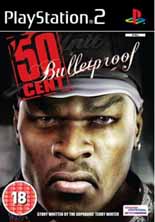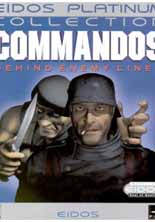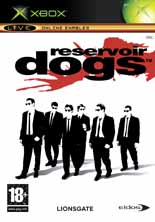10. 50 Cent: Bulletproof
Banned in: Australia

Why? The Australian censor is notoriously heavy-handed, and ranks as one of the most ban-happy boards in the world. While the Office of Film and Literature Classification (OFLC) accepted the foul language, drug use and excessive violence in Fiddy's actually-quite-crap vanity exercise, they were turned off by the slow-motion counter-kills - specifically the ones involving knives and onscreen blood splatter. To be brutally honest, it was no great loss...
9. Commandos: Behind Enemy Lines
Banned in: Germany
 Why? Germany enforces extremely strict censorship on videogames, and as such game publishers will often do a special Teutonic version to pacify the examiners. An oft-quoted example is the use of green blood, which marks the character being killed as an "alien," thus making it more acceptable. Commandos was banned on a more obvious technicality: an issue with missions that involve allied soldiers going on missions to kill Nazis, and use of the swastika.
Why? Germany enforces extremely strict censorship on videogames, and as such game publishers will often do a special Teutonic version to pacify the examiners. An oft-quoted example is the use of green blood, which marks the character being killed as an "alien," thus making it more acceptable. Commandos was banned on a more obvious technicality: an issue with missions that involve allied soldiers going on missions to kill Nazis, and use of the swastika.
8. Pokémon
Banned in: Saudi Arabia

Why? One of the more bizarre bannings has religious foundations - in 2001 Pokémon and all its associated spin-off games were the subject of a fatwa in Saudi Arabia, which said the games featured the Star of David, which Saudis associate with Israel and international Zionism. It was suggested the games had "possessed the minds" of Saudi children. The edict was expected to be followed rather strictly, as punishments would likely include lashings and deportation.
7. The Guy Game
Banned in: United States

Why? A morally reprehensible game in theory and in practice (IGN gave it 7.7), The Guy Game was a frat boy's dream that focused mostly on tits and beer with some trivia thrown in. What its makers failed to realize was that one of the cheerleaders who flashed her parts on camera during the course of the game was only 17, and thus underage. She complained and the game became illegal.
6. Mercenaries: Playground of Destruction
Banned in: South Korea

Why? Not surprisingly South Korea don't take too lightly to games that involve fictional representations of wars between themselves and their slightly mental Northern cousins. To be honest, we'd probably be the same if old Kim Jong II was breathing down our necks.
5. Command and Conquer: Generals
Banned in: China

Why? This strategy game got the backs of the Chinese government up, with the Ministry Of Culture proclaiming it "smeared the image of China and the Chinese army." It also took offense that the game required players to destroy various national monuments like the Three Gorges dam.
4. Ghost Recon Advanced Warfighter 2
Banned in: Mexico

Why? Seriously pissed off one Chihuahua Governor Jose Reyes Baeza Terraces, who discovered that Ubisoft's game featured a fictional storyline in which citizens of Chihuahua fled their town and were replaced by armed insurgents. Unfortunately, Terraces exposed his painful lack of video game knowledge when he was quoted as saying, "Violent video games ... attempt to divide the good will of the residents of American and Mexican cities."
3. Reservoir Dogs
Banned in: New Zealand

Why? No great surprises here, as anything associated with Quentin Tarantino seems to attract a fair degree of controversy - not that he had anything to do with this woeful adaptation of his 1992 film debut. Amazingly, given the film's cult classic status today, the BBFC (which is responsible for the banning of Manhunt 2) initially refused to give it a video classification, and it wasn't until 1995 that UK film fans could see it outside of a movie theater. The New Zealand Office of Film and Literature Classification banned it on much the same grounds as the BBFC did, saying "the film tends to promote and support the infliction of extreme violence and extreme cruelty… for the purpose of entertainment."
2. Marc Ecko's Getting Up: Contents Under Pressure
Banned in: Australia
 Why? Although style guru Marc Ecko's graffiti game was initially granted a 15 rating by the Australian OFLC, it was later banned after an appeal ruled that the game promoted an illegal act (graffiti), gave hints and tips on how to do it and rewarded the player for scribbling "I love Tracey" on public buildings and infrastructure. Clearly the Aussies don't do hip-hop.
Why? Although style guru Marc Ecko's graffiti game was initially granted a 15 rating by the Australian OFLC, it was later banned after an appeal ruled that the game promoted an illegal act (graffiti), gave hints and tips on how to do it and rewarded the player for scribbling "I love Tracey" on public buildings and infrastructure. Clearly the Aussies don't do hip-hop.
1. Postal
Banned in: 13 countries
 Why? The fact it's advertised as banned in 13 countries works in the same way that Ruggero Deodato's exploitation-film classic Cannibal Holocaust was supposedly banned in 50 countries - it's a great selling point. Unsurprisingly, it's not available in Germany and Australia, and someone tried to get it banned in the US. It's got a lot to do with the fact the minimal plot involves the lead character going on a killing spree, shooting people, innocent or not, simply because he's angry about being evicted from his house.
Why? The fact it's advertised as banned in 13 countries works in the same way that Ruggero Deodato's exploitation-film classic Cannibal Holocaust was supposedly banned in 50 countries - it's a great selling point. Unsurprisingly, it's not available in Germany and Australia, and someone tried to get it banned in the US. It's got a lot to do with the fact the minimal plot involves the lead character going on a killing spree, shooting people, innocent or not, simply because he's angry about being evicted from his house.
0 comments:
Post a Comment